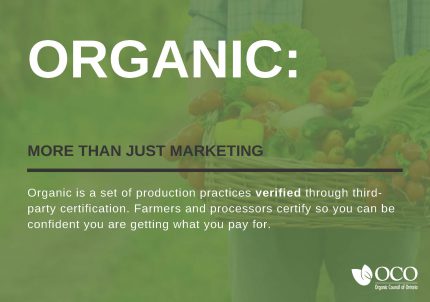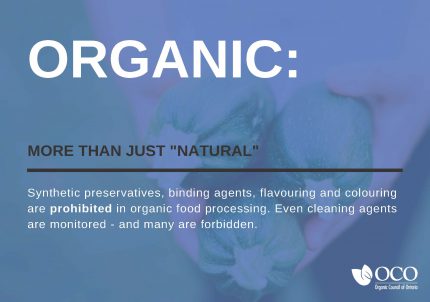Learning about the regulating of Organic in Ontario
Posted: November 14, 2017
Categories: GoodFoodBites / Growing Good Food Ideas / News from Sustain Members / Opportunities

The Organic Council of Ontario(OCO) a member of Sustain Ontario has launched a campaign to inform Ontarians about the facts regarding regulating organic in Ontario. To help spread the word about the campaign you can order organic campaign postcards here! Below is information about regulating organic and the OCO campaign provided by the OCO:
Regulating Organic in Ontario
Many Ontarians do not know that federal regulation for organic products only covers those products that cross provincial borders or carry the Canada Organic Logo. Products that simply carry the word organic – and are sold within Ontario – are not currently regulated.
In September, Peter Tabuns, MPP for Toronto-Danforth (NDP), and Sylvia Jones, MPP for Dufferin-Caledon (PC), announced a co-sponsored private member’s bill called the Ontario Organic Products Act that would initiate the creation of an organic products regulation in Ontario. The bill was developed in partnership with the Organic Council of Ontario (OCO), the voice for Organics in Ontario and a Sustain Ontario member.
If passed, the legislation will set in place a legal framework to close the regulation gap in Ontario. OCO sees this bill as the beginning of a process that will allow all farmers and members of the organic value chain to contribute to the contents of the final regulation, which could include better supports for farms during organic transition. We envision a lag in implementation so that businesses have time to get educated and prepare themselves for any changes.
Definitions
Product definitions in the proposed bill allow for organic products to include items outside of those currently within the scope of the Canadian Organic Standards. This means there is potentially room within the bill to cover textiles and body care products within the province of Ontario.
Certification
While the proposed bill would require the provincial government (through the Minister of Agriculture, Food and Rural Affairs or the Minister of Government and Consumer Services) to regulate the term “organic”, it does not specify exactly how this would happen.
While the Minister would decide on how to regulate organic certification in Ontario, it is likely that Canadian federal standards would be adopted and federally accredited certification bodies selected – as is the case in other provinces with similar legislation.
Register
Legislation would also see the Minister (or a body appointed by the Minister) create an Organic Products Register. It would list all operators’ products that have been certified organic and be published on a Government of Ontario website.
 Administrative Penalties and Fines
Administrative Penalties and Fines
On advice from other provinces, we worked to allow for flexibility in assessing and enforcing penalties for non-compliance. This includes wording on fines and convictions for violating the act, as well as administrative monetary penalties, which can be imposed without involving the courts. Including both within the Act provides the Ministry with tools for addressing different types and scales of offences.
Complaints-Based
The proposed legislation would work on an easier-to-enforce, complaints-based system, rather than a proactive one. As such, resources required for enforcement would be minimal. Clearer intra-provincial regulations, however, may also increase the CFIA’s efficacy in monitoring and enforcing “organic” claims.
What this means:
For producers: Producers who already have certification will see their investment supported through law. Smaller producers who may see challenges with transition and certification costs will be engaged by the Organic Council of Ontario in developing a small-scale solution and advocacy for greater supports. The Ontario Ministry of Agriculture, Farming and Rural Affairs has agreed to consult with agricultural organizations on regulating organic, opening a door for smaller producers to voice their interests.
For retail: This legislation helps reinforce the responsibility retailers have to maintain the integrity of their products and labelling systems. There may be penalties for mislabelling products as “organic” in retail locations.
For consumers: Consumers will have greater assurance that the “organic” products they buy are indeed organic. They will also have access to a register of all producers with organic certification to make more informed purchasing choices.
Consumers deserve to know that they are really getting organic when they pay for it. When they lose confidence in the organic brand, hardworking local organic farmers and businesses lose too. This is an issue that has widespread support among farms & businesses. To date, all three general farm organizations have expressed their support for this bill, and five other provinces have already implemented organic regulation to allow for better oversight of organic claims. (NB, NS, MB, BC and QC). The agriculture industry understands the need for better oversight of organic claims in this province.
Get Involved!
If you are interested in providing feedback on the bill or contributing to the design of small-scale supports, please contact john@organiccouncil.ca.
We also need your help to make sure Bill 153 passes:
- Call or email your MPP.
- Donate to the campaign
- Distribute our postcards to your customers and colleagues.
Visit www.organiccouncil.ca/regulation for more information, sign up for our e-news and/or become a member.
